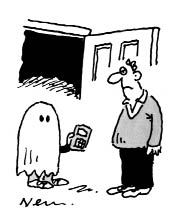The first time I saw my name in print, in almost its own right, was in late 1997, after a person who was a friend, but isn’t one any more, called up Londoners’ Diary and told a young journalist who would later become a friend, but wasn’t one at the time, that I’d helped to organise a Cambridge student demonstration against tuition fees.
The first time I saw my name in print, in almost its own right, was in late 1997, after a person who was a friend, but isn’t one any more, called up Londoners’ Diary and told a young journalist who would later become a friend, but wasn’t one at the time, that I’d helped to organise a Cambridge student demonstration against tuition fees.
Obviously it was really about my dad, but I had a starring role. ‘His handsome son Hugo’, they called me, which I affected to find totally, like, demeaning, on account of the way I was a feminist, but was actually quite chuffed about. The justification for the piece, anyway, was that the Conservative party at the time had a certain view on tuition fees (which it later changed, and then changed again and then, although I’d have to check, possibly changed again) and here was the son of a man who used to be an MP but currently wasn’t one holding a banner which implied he didn’t entirely agree with it.
‘This is diary gold!’ they must have shouted on the desk. ‘Ditch the third item about Nicky Haslam!’ Ah, gossip journalism. ‘What a dreary, pointless job, where you have to write crap like that,’ I remember thinking to myself, vaguely, before falling into a stupor for the next eight years, and waking up doing it.
Realistically speaking, I suppose I must have had reasons for marching against tuition fees. The thing is, I’m buggered if I can remember what they were. They weren’t going to be very much money (a little over a grand a year) and you have to have done really quite badly in life not to have paid them off within three years of starting work. Still, we had passionate objections. I have a distant memory, from somewhere near King’s Parade, of my little mob bumping into another little mob (which contained a man who is now a respected economics correspondent) and there being a fevered debate about whether ‘Who Paid For You, Mr Blair?’ was an acceptable slogan to shout.
The verdict was that it wasn’t, because it missed the point. As to what this point was, alas, I simply don’t recall. Had Mr Blair been there, I suppose, he could have shouted ‘lots of people poorer than me, through taxes!’ and we all would have felt pretty foolish. By lucky happenstance, though, he was not.
All in all, I think our objection had something to do with working-class people. Although it’s hard to be sure, because hardly any of us really knew any. You didn’t really get many working-class people at Oxbridge in the 1990s. You mainly just got middle-class people whose parents had decided to spend their cash on the mortgage rather than school fees. You know, people like the Milibands. Prior to the march, I remember finding one proper working-class person, with an accent and everything, and asking him if he’d be coming along. ‘No,’ he said, to paraphrase. ‘Why should my parents subsidise your education, so you can piss it away dicking around doing stuff like this?’
Anyway. I’ve been thinking about this quite a lot these past couple of weeks. Partly this is because of the latest tuition fees proposals, which I don’t like much, but prefer to any other possible outcome, so technically, I suppose, must be in favour of.
Mainly, though, it’s because of the French. All those students, and school kids even, taking over the streets. Looking fantastic, with their blonde hair and their scarves and their lipstick. Wittering on about the way they’re going to have to wait 50 years for their pension, rather than 45, as if either one means anything when you’re 17. Complaining, in effect, about proposals to make them spend their life paying less tax. What are they marching for? The status quo, just like we were. Students aren’t really the future. For at least a generation, they’ve been fighting for the past.
There’s a bit in Gillies Mackinnon’s Glasgow gangland flick Small Faces where the hero, Lex, meets a boy who claims to be 16. ‘You’re awfy small,’ says Lex. ‘I smoke a lot,’ says the boy, fiercely. That’s who Nick Clegg reminded me of, confessing to his secret nicotine habit this week on Desert Island Discs.
Of course, time was that Nick Clegg did other things quite a lot, too. He’ll have been thrilled, I’ve always thought, to have earned the nickname ‘Cleggover’ for claiming to have slept with ‘no more than 30’ women. Because you could just tell, couldn’t you, that he’d got back from each one of those encounters, convened his closest Lib Dem friends, and announced, ‘Gentlemen! I have been making love with a beautiful woman!’ in the manner of Swiss Toni from The Fast Show.
David Cameron smokes a bit, and doesn’t seem to particularly think about it. Barack Obama smokes a bit, and never wants to talk about it. Nick Clegg wants you to know. ‘I smoke a lot,’ says the boy, to sound like a man.
Hugo Rifkind is a writer for the Times.







Comments